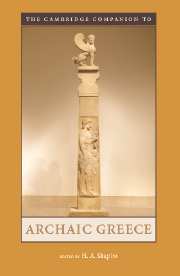9 - Delphi, Olympia, and the Art of Politics
from Part 3 - History and Material Culture
Published online by Cambridge University Press: 28 November 2009
Summary
“For Froma Zeitlin” / “From the eighth century onwards, the history of inter-state sanctuaries, including the two most prestigious, Olympia and Delphi,was the history of the establishment of a state framework for pilgrimage.” - Catherine Morgan, Athletes and Oracles, 234. / The “Panhellenic” sanctuaries of Delphi, Olympia, and Delos are astonishingly complex, and their importance for the history of early Greece can hardly be overstated. To consider even the most exiguous remains from one of these sites is, immediately, to find oneself enmeshed in an intricate web of economic, social, artistic, literary, and religious histories. The present discussion, accordingly, does not attempt to be in any way systematic, nor does it offer detailed histories of the sites themselves. Instead, it will knit together a few of these remains, tracing their interconnections and their underlying patterns. The daunting complexity of these sites has one benefit: their inscriptions, statues, and buildings are mightily overdetermined, threaded through with cross-cutting political and ideological strands. They are, for that very reason, at once difficult and fascinating. Individual monuments both demand and reward close attention; hence this chapter will move from the relatively general and schematic to the relatively specific and concrete, from secondary literature to the close reading of poems and sculptures.
- Type
- Chapter
- Information
- The Cambridge Companion to Archaic Greece , pp. 225 - 264Publisher: Cambridge University PressPrint publication year: 2007
- 12
- Cited by



